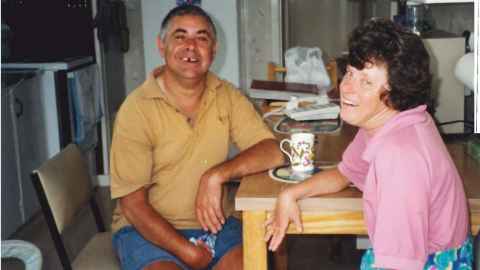Generous bequest to ABI set to brighten futures
16 May 2022
People with movement disorders are set to benefit from the generosity of a remarkable couple.

W hen Carlo Fiorentino died in 2021, he left an estate worth $1 million to the Auckland Bioengineering Institute (ABI). The legacy, the first bequest made to the ABI, will support the research of Professor Thor Besier and his team in the Musculoskeletal Modelling Group at the ABI, aiming to improve the lives of people with movement disorders such as cerebral palsy. Both Carlo and his wife Julie Thornley, who died in 2019, were born with cerebral palsy.
The condition is caused by damage to parts of the brain before, during and after childbirth, and affects a person’s ability to control movement. The lesions that cause the disease are static, yet people with the condition typically walk in ways to compensate for their abnormal muscle activity. This leads to abnormal bone and muscle development in the lower limbs, which further affects movement.
Thor and his team have for several decades been developing computational models of the musculoskeletal system based on the laws of physiology and physics.
“If we can better understand this system, which includes hundreds of muscles, bones and tissues, and how it adapts and responds to how people move, the better we’re placed to prevent disease progression,” Thor says.
Carlo heard Thor talking about his research on RNZ and got in touch with him.
“Carlo was excited to hear about what we were doing, so we met at his house, had a cup of tea and chatted about his life and the challenges he and Julie faced growing up in New Zealand.
“Our attitudes towards disability have changed a lot over the past few decades, and our research has accelerated our understanding of the neurological and musculoskeletal consequences of cerebral palsy, but there is still much to be understood.”
Carlo was keen to hear how the ABI research might make a real difference.
“So I invited him to visit and meet our team to learn more about what we were doing. He particularly enjoyed the enthusiasm of the early career researchers and postgraduate students who want to make a difference for people such as himself.”
In the 60s it was common for young people with a disability to end up in geriatric hospitals or aged care.
Carlo was born in Nelson in 1949, and Julie in Wellington in 1953. Jane Carrigan, their friend and disability advocate for more than a decade, and the executor of their will, says the couple lived their lives “with courage, dignity and joy” even though in their later years, “they were almost completely dependent on the care of third parties”.
They had met as teenagers at the Pukeora Home for Disabled in Hawke’s Bay, a place they enjoyed, but Pukeora was for young people and there came a time when they had to leave.
“That was the 60s when it was common for young people with a disability to end up in geriatric hospitals or aged care,” says Jane. “They were terrified of that.”
Their futures were made brighter by the opening of Laura Fergusson Trust residential facilities in Auckland in 1970, where people were encouraged to live as independently as possible. Carlo spent several months at the Palmerston North Hospital Rehabilitation Unit to get himself sufficiently independent to qualify for Laura Fergusson and he was accepted in 1972. It was another three years before Julie was able to join him.
Carlo was excited to hear about what we were doing, so we met at his house, had a cup of tea and chatted about his life and the challenges he and Julie faced growing up in New Zealand.
Once accepted into the Laura Fergusson Trust, Julie enrolled in a Zoology paper at the University of Auckland.
“She passed, but with no tangible support it was just too difficult for her to continue and, much to her distress, she had to pull out,” says Jane.
Carlo worked for a construction company as a calculator operator and Julie as a newspaper sub editor. They stayed at the Laura Fergusson Trust residence until the late 1980s when they bought a home nearby. They married in 2012.
Julie passed away before hearing of Thor’s research.
“But with her love of science and her great empathy for children, Carlo was confident she would approve of leaving their estate to the ABI,” says Jane.
Their bequest, from the sale of their home, will establish and support the Carlo and Julie Fiorentino PhD Scholarship in Movement Disorder at the ABI.
Story by Margo White for the Autumn 2022 issue of Ingenio.